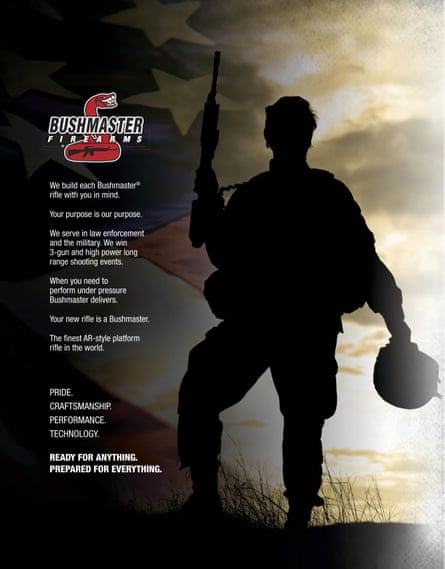For a seven-year-old, Daniel Barden was unusually compassionate. He worried when he saw anyone isolated. His mother remembers him sitting next to a special needs girl in his class to “make sure she was OK”. She would always lose her glasses, and Daniel would always find them.
“He felt if you were alone, it was a problem,” his mother said.
On a Friday morning not long before Christmas 2012, a disturbed 20-year-old drove up to Daniel’s elementary school. He had been the kind of boy that Daniel might have reached out to, Daniel’s father would think later. For years, Adam Lanza had struggled with severe anxiety and obsessive compulsive disorder. He was so gaunt a report would conclude he was anorexic. He had been diagnosed with Asperger syndrome and had grown increasingly isolated during middle and high school. By the time he was 20, he had little social contact except with his mother, and no record of continuing mental health treatment.
Just after 9.30am, Lanza shot his way through Sandy Hook elementary school’s locked front door. He was carrying a military-style rifle and hundreds of rounds of ammunition. In roughly five minutes, officials said, he had fired 154 times, killing 20 first-graders and six staff members. Then, as police began arriving at the school, he killed himself.
Daniel was one of the 20 six- and seven-year-olds that Newtown, Connecticut had to bury that month. Several weeks after the memorial service for her youngest son, Jackie Barden went to the family room and sat down at the computer. Her family knew very little about firearms. Her two older children had questions about what had happened to Daniel, and so did she. “How could somebody even know about this weapon? That was my thought,” she said. “How would this young boy learn about this weapon and what it does?”

What Jackie found with a quick Google search were the macho advertising campaigns for Bushmaster, the company that manufactured the rifle that had been used to murder her son. “Consider your man card reissued,” one ad read, with a photo of a black rifle. “Forces of opposition, bow down,” another read.
For a mother whose child had been shot to death by that rifle in his first-grade classroom, the images were shocking.
She remembered thinking: “How can it be, in this day and age, that they’re advertising like this? This is so irresponsible.”
To the Barden family, the ads seemed designed to appeal to exactly the kind of troubled young man who had killed their son. “Here you have this machine that was designed for use by the military being sold to civilians, to untrained civilians, with aggressive military battlefield language,” her husband, Mark, said. “And guess what? History has shown that these people who are suicidal, disturbed individuals who are bent on killing large numbers of people – that’s the weapon they choose.”
“We were told very early on, well, that’s just the way it is and the gun manufacturers are untouchable,” Jackie said.
But they talked with an attorney about their concerns about the advertising, she said, and months later the attorney got back in touch; a lawsuit might actually be possible. In December 2014, working with a prominent Connecticut law firm that specializes in medical malpractice and injury suits, the Bardens, one survivor of the Sandy Hook shooting, and eight other family members of victims filed a lawsuit against the maker, distributor and dealer of the Bushmaster rifle used in the shooting.
Families of six year-olds Dylan Hockley, Benjamin Wheeler, Jesse McCord Lewis and Noah Pozner are part of the lawsuit, along with surviving teacher Natalie Hammond, the families of teachers Vicki Soto and Lauren Rousseau, behavioral therapist Rachel Marie D’Avino and school psychologist Mary Sherlach.

The companies’ militaristic marketing of the AR-15 style rifles is at the center of the suit. From a legal perspective, experts say, the lawsuit has a remote chance of success. But it has gained political prominence in the Democratic presidential race, with Hillary Clinton using her support for the lawsuit as a rallying point on her way to victory in the New York state primary, and Bernie Sanders facing increasing criticism for his comments against it.
The Vermont senator has repeatedly said that he does not think it is right for a local gun dealer who legally sold a gun to be held responsible if someone later uses that gun to commit a crime. “If it’s getting into the hands of criminals, of course they should be held liable,” Sanders said at a March debate. “But if they are selling a product to a person who buys it legally, what you’re really talking about is ending gun manufacturing in America. I don’t agree with that.”
At the most recent debate, Sanders said he did not think he owed the Sandy Hook families an apology for his remarks, but also shifted in saying: “They have the right to sue, and I support them and anyone else who wants the right to sue.”
The Sanders campaign did not respond to a request for comment last week on whether this represented a change in the senator’s position.
“I think he embarrassed himself,” Mark Barden said of Sanders. He and Jackie wrote a Washington Post op-ed last month arguing that Sanders had misunderstood the point of their lawsuit.
Clinton is continuing to push on the issue of gun violence. Her campaign said she would speak on gun violence in Hartford on Thursday and meet with gun violence victims, including Sandy Hook families.
Jackie said one major goal of the lawsuit is to reveal information about who gun companies target with their marketing, what the industry’s internal strategies are, and how gun companies work with videogame companies to feature their weapons in violent games.
“I think that who they are focusing on in their advertisements are young men that maybe do not feel manly and secure, and who are disenfranchised with their lives and maybe feel powerless,” Jackie said. From what the parents learned about the Sandy Hook shooter, he was a loner, angry, “and didn’t have a lot of power”, she said. “This was his way to show his power.”
Lanza had been able to choose from several different weapons before he drove to her son’s elementary school. Jackie did not think it was an accident that he chose the Bushmaster rifle: “That one was telling him, if you want power, this is for you.”

‘The whole thing is a farce’
For gun rights advocates, the lawsuit is yet another attempt by people who know little about guns to demonize a rifle that is functionally no different from many other weapons.
“The whole thing, from our perspective, is a farce,” said Bob Crook, a lobbyist and the executive director of the Coalition of Connecticut Sportsmen, a group that represents roughly 40,000 fishing, hunting, shooting and outdoor enthusiasts. (Crook, he noted, is a “hell of a name for a lobbyist”.)
Actual weapons of war, Crook said, are capable of fully automatic fire, spraying a constant stream of ammunition. Civilian ownership of these kinds of fully automatic weapons has been severely monitored and restricted since 1934.
Semi-automatic rifles, including the AR-15, fire one round with every pull of the trigger – a characteristic of a wide range of modern firearms. The AR-15 “fires no faster than any other semi-automatic”, Crook said. “This stuff about ‘it’s a weapon of war’ – it’s just plain stupid.”
The AR-15 style of rifle that had been used at Sandy Hook is extremely popular with American gun owners, who praise it for being light, adaptable and easy to handle. Compared with handguns, rifles are used rarely in murders.
“They’re made to appeal to the general public, and the general public has bought millions and millions of them,” Crook said.
“If they were marketing to disturbed young men, or disturbed men in general, we’d have millions and millions of disturbed men in the country,” he said. “It isn’t rational.”
In 2005, Congress passed a shield law that blocked certain kinds of liability suits against firearms companies. The defendants in the Sandy Hook lawsuit – including manufacturers Remington and Bushmaster; Camfour, a firearms distributor; and a local Connecticut gun store – say the Sandy Hook lawsuit against them is exactly what the federal shield law was designed to prevent: a tragic misuse of a product being blamed on its legal manufacturers.

Clinton has made repealing the firearms shield law one of the rallying points of her campaign, decrying “the greed and recklessness of gun manufacturers and dealers in America”.
She has also used her fight agains the gun company immunity law to hammer her opponent. Sanders voted in favor of the law.
Lawyers for the Bardens and the other families involved in the lawsuit are hoping to succeed in their suit despite the shield law. The 2005 law does not shield gun companies from liability if they knowingly violate a state or federal law, if their products are defective, or if they negligently entrust their products to someone who clearly should not have them.
The weapons Lanza used were legally purchased by his mother, and they worked exactly as they were designed to do. But Koskoff, Koskoff and Bieder, the Connecticut law firm representing the families in the case, is arguing, in a creative legal move, that military-style weapons are unsafe for any untrained civilian to own or use, and that the gun companies they are suing are negligent to have entrusted them to any member of the general public.
The families participating in the lawsuit saw a small victory last week when Judge Barbara Bellis denied the gun companies’ motion to dismiss the lawsuit. The ruling was a narrow and technical one, however, which did not address the central question of the suit: whether it can go forward despite the federal shield law.
On Tuesday, in Bridgeport, Connecticut, the court set a potential trial date of 3 April 2018. To get to trial, the suit has to survive a new motion by the gun companies to strike the case. Adam Winkler, a second amendment expert at the UCLA School of Law, wrote in an email that the gun companies “are likely to win” that motion.
Mark Barden, who was at court on Tuesday, said he was surprised and excited that the lawsuit had even made it this far.
Josh Koskoff, one of the attorneys representing the families, said they are eager to start the discovery process, which would allow the plaintiffs to obtain internal documents and interviews from the gun companies. “We’ve already filed requests for production of documents,” he said.
The gun companies have filed a motion to delay the discovery process until the court rules on their motion to strike the case. Judge Bellis will rule on whether discovery can move forward on 5 May.
For the Sandy Hook families involved in the case, a lawsuit focused on the weapon used in the shooting is only one of the many fronts in their push to prevent other school shootings, including fighting for stricter gun laws and helping to develop and spread intervention and prevention programs at the local level.
Mark Barden says their family, including their 16-year-old son and 14-year-old daughter, tries to live a quiet life outside of their advocacy work. “We spend a lot of time with our kids and each other,” he said. “We pretty much hunker down at home. We’re not very social.”
“Everything that happens magnifies what our loss is,” Jackie said. “I would much prefer having Daniel in his bed.”
As they continue to deal with his loss, the family has tried to do small things to add brightness to their lives, Jackie said. They worry less about money. They go out to dinner more often. “I look at my kitchen and I have flowers on my table. Before this happened, I would never buy flowers,” she said. “We were worrying about every dime.” But even these small efforts are a reminder. “Now I buy flowers,” she said, “and the flowers represent what happened to us.”
To see all the political attention the lawsuit is getting is a “strange feeling”, she said. “It really doesn’t bring that much happiness.”
- This article was amended on 21 April 2016. An earlier version named one of the victims of the Sandy Hook shooting as David Wheeler; this has been corrected to Benjamin Wheeler.
